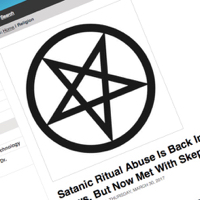Rascals case in brief
In the beginning, in 1989, more than 90 children at the Little Rascals Day Care Center in Edenton, North Carolina, accused a total of 20 adults with 429 instances of sexual abuse over a three-year period. It may have all begun with one parent’s complaint about punishment given her child.
Among the alleged perpetrators: the sheriff and mayor. But prosecutors would charge only Robin Byrum, Darlene Harris, Elizabeth “Betsy” Kelly, Robert “Bob” Kelly, Willard Scott Privott, Shelley Stone and Dawn Wilson – the Edenton 7.
Along with sodomy and beatings, allegations included a baby killed with a handgun, a child being hung upside down from a tree and being set on fire and countless other fantastic incidents involving spaceships, hot air balloons, pirate ships and trained sharks.
By the time prosecutors dropped the last charges in 1997, Little Rascals had become North Carolina’s longest and most costly criminal trial. Prosecutors kept defendants jailed in hopes at least one would turn against their supposed co-conspirators. Remarkably, none did. Another shameful record: Five defendants had to wait longer to face their accusers in court than anyone else in North Carolina history.
Between 1991 and 1997, Ofra Bikel produced three extraordinary episodes on the Little Rascals case for the PBS series “Frontline.” Although “Innocence Lost” did not deter prosecutors, it exposed their tactics and fostered nationwide skepticism and dismay.
With each passing year, the absurdity of the Little Rascals charges has become more obvious. But no admission of error has ever come from prosecutors, police, interviewers or parents. This site is devoted to the issues raised by this case.
On Facebook
Click for earlier Facebook posts archived on this site
Click to go to
Today’s random selection from the Little Rascals Day Care archives….
Click for earlier Facebook posts archived on this site
Click to go to
Today’s random selection from the Little Rascals Day Care archives….
Time for Truth and Reconciliation Commission
Three years ago a former Edenton resident told me: “The town leaders still have some things to answer for about Little Rascals, and I suspect that until there is a process of reconciliation, the town will remain a troubled place, though it does a good job putting on a facade.”
Edenton will elect its town officials Nov. 5. The predominant issues – population decline and the lack of a second supermarket – are clearly important, but I want to add another. This is from a query I sent all the candidates:
I don’t live in Edenton, but I’m reaching out to candidates for mayor and town council about a local issue of historic importance.
The Little Rascals Day Care case was Edenton’s most significant event of the 20th Century. The trial of Robert Kelly remains the longest and most expensive in North Carolina history. He served six years in prison before the North Carolina Court of Appeals overturned his conviction and that of Dawn Wilson. The lives of Kelly, Wilson and the five other defendants were profoundly harmed over allegations of “satanic ritual abuse” of children in their care.
The Little Rascals case, most prominently covered by eight hours of documentary coverage on PBS’s “Frontline,” also did nationwide damage to the town’s reputation. But Edenton has never reexamined, much less made amends for, the wrongful prosecution of the Edenton Seven. One way to move forward would be to create a Truth and Reconciliation Commission.
Fact-finding, non-judicial truth commissions first appeared in the 1970s and have since been used to foster honest discussion and to encourage reconciliation in the aftermath of community conflict.
In North Carolina the Greensboro Truth and Reconciliation Commission was an independent, seven-member body that sought to heal a city left divided and weakened by the “Greensboro Massacre” of 1979. The parallel to Edenton is inexact but undeniable.
If elected, would you consider supporting a Truth and Reconciliation Commission to address Edenton’s continuing divide over the Little Rascals Day Care case? Thank you for your time and attention. And good luck in your campaign.
The two candidates who have responded so far seem at least cautiously open to the idea. One day the Town of Edenton will surely find the courage to embark on its long-avoided “process of reconciliation” – let’s hope the Edenton Seven are around to see it.’
‘Why hadn’t any of the suspects copped a plea?’ he wondered

Kuhlmwywe
Feb. 2, 2018
“In August 1983 [Manhattan Beach, Calif., police chief Harry] Kuhlmeyer was presented with the McMartin Preschool case. Therapists and medical doctors had identified dozens of McMartin children as sexual abuse victims. Raymond Buckey, the sole male teacher at the preschool owned by his grandmother Virginia McMartin, was the primary suspect….
“Parents demanded Buckey’s immediate arrest, but Kuhlmeyer refused. His detectives could find no corroborating evidence.
“ ‘Why hadn’t any of the suspects copped a plea, why no mea culpas, no suicides? No one got drunk and bared his soul. If everything the kids said happened, it looked like the perfect crime. Even the Mafia has snitches,’ Kuhlmeyer said.
“The Los Angeles County District Attorney’s office… drew up an arrest complaint about Buckey, but Kuhlmeyer refused to sign it. [The DA took the case to the grand jury, which routinely rubber stamps indictment requests.]
“Kuhlmeyer’s unpopular stance was vindicated seven years and $15 million in court costs later when two McMartin trials ended with no convictions.”
– From “Police chief during McMartin case refused to charge abuse suspects” by Kevin Cody in Easy Reader News (Jan. 31)
No such doubt, by either police or prosecutors, slowed the rush to put the Edenton Seven behind bars. The result, of course, was a disaster of McMartin dimensions.
Chief Kuhlmeyer died Jan. 12 in Santa Monica, Calif. He was 94.
![]()
Why the panic ‘needs to be remembered’
 April 22, 2013
April 22, 2013
“Lecturing recently, I mentioned the American witch-hunts of the 1980s and 1990s. When the audience looked puzzled, I explained that I was referring to the Satanic Panic of those years, the wave of false charges concerning ritual child abuse and devil cults that made regular headlines in the decade after 1984. The explanation helped little.
“Even people who had lived through those years, who had been following the media closely, had precisely no recollection. Lost in memory it may be, but the Satanic Panic needs to be remembered, if only to prevent a renewed outbreak of this horrible farrago. And when better than in the 30th anniversary of the affair’s beginning?
“It all started in southern California, in Manhattan Beach, in the Fall of 1983….”
– From “Remember the Satanic Panic” (Jan. 9, 2013) by Philip Jenkins, Distinguished Professor of History at Baylor University, on Real Clear Religion
I share Dr. Jenkins’ concern about public memory, of course.
Which are more worrisome – those who have no recollection at all of cases such as McMartin and Little Rascals, or those who have forgotten they all were hoaxes?
Press decides to let Sir Edward Heath rest in peace
 April 6, 2017
April 6, 2017
“Beginning with the McMartin preschool case in 1984… much of the media accepted without question fantastic claims brought by police, parents and prosecutors. But by the early 1990s when the courts began tossing out convictions based on recovered memories, coached testimony, and magical thinking, the media backed away….
“Two stories in the U.S. and British press have resurrected SRA: Pizzagate and abuse claims lodged against deceased British Prime Minister Edward Heath. However, this time round these stories are being treated with skepticism ….
“Abuse is a serious enough crime without having the false and inflammatory adjective of ‘satanic’ appended to it. I am glad to see The Sun and Mail on Sunday are treating this aspect of the claims as being ridiculous….”
– From “Satanic Ritual Abuse Is Back In The News, But Now Met With Skepticism” by George Conger at the Media Project (March 30)
![]()











0 CommentsComment on Facebook